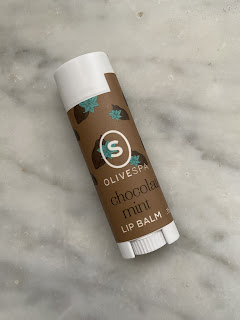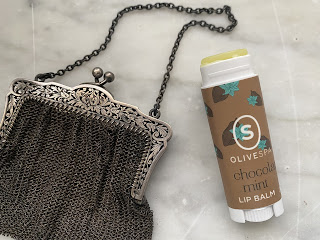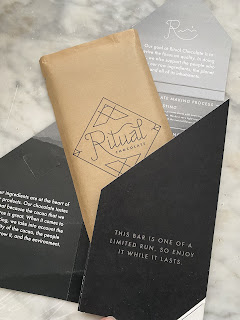Tucked away by a corner at Kierland Commons in Scottsdale is Queen Creek Olive Mill, where you will find not just olive oil but also various other olive products and a few miscellaneous other culinary items, like jellies and honey. You will also find the Olivespa section, filled with products made here in Arizona at the Queen Creek Olive Mill location itself.
The product I have an excuse to talk about is the Chocolate Mint Lip Balm. It sits along with other scents like Vanilla Bean, Lavender, and Orange Blossom. (There is also an Unscented option.) The white case is slightly flattened instead of being completely round, so it won't roll away when you set it on a desk or table. The colors of the labels vary depending on the scent, but each one is still fairly soft in coloration and simple in its use of lavender or, in this case, cocoa pod icons. It all hits that balance between handmade and elegant.
I've used various handmade or small batch type lip balms over the years and I've used olive soap, but I've never used a lip balm that highlights olive oil the way this one does. The balm is the color of olive oil, not tinted light brown like some chocolate balms are. The chocolate element comes in from "natural cocoa oil and flavors," which has some room for interpretation. Other ingredients are olive oil, beeswax, coconut oil, shea butter, red raspberry seed oil, and peppermint oil. The olive oil being the primary ingredient is what's different from other balms I've tried. And it definitely makes a difference.
The first time I tried this balm, I could taste the olive oil right away--which felt different for a lip balm and also not entirely in line with the chocolate mint. After that, though, I hardly ever seem to notice it. What I do notice, though, is that this balm is much more moisturizing than others and also longer-lasting. It reminds me, more than anything else, of the agave lip balm that Bite Beauty used to make before they, essentially, went out of business. And that lip balm was the best.
Chocolate is tricky when it comes to products like this. You can't really add pure, real chocolate flavor/scent to a balm--at least, I haven't seen it done. The Chocolate Lip Balm that I tried from Eldora Chocolate a couple years ago was even labeled as unscented rather than add faux flavor. The chocolate here is okay; it's miles better than a chocolate balm from Lip Smacker would be. But it still gives off a little of that faux feeling; it just doesn't quite match the taste of real chocolate. It goes well with the mint, though; the mint flavor is fine, given that it can come directly from peppermint oil.
There might be some irony in the fact that the chocolate element was my excuse to buy and talk about this product--yet I'm coming out saying that I really like the product, just not the chocolate part. That is, if you don't mind this type of chocolate scent, go for it. For myself, I probably won't be buying the Chocolate Mint again. But I may have found my new go-to for lip balm, just in perhaps the Lavender or Vanilla Bean or Herbal Infusion instead.









